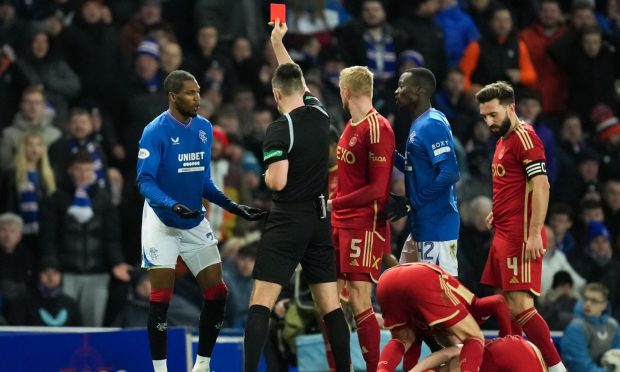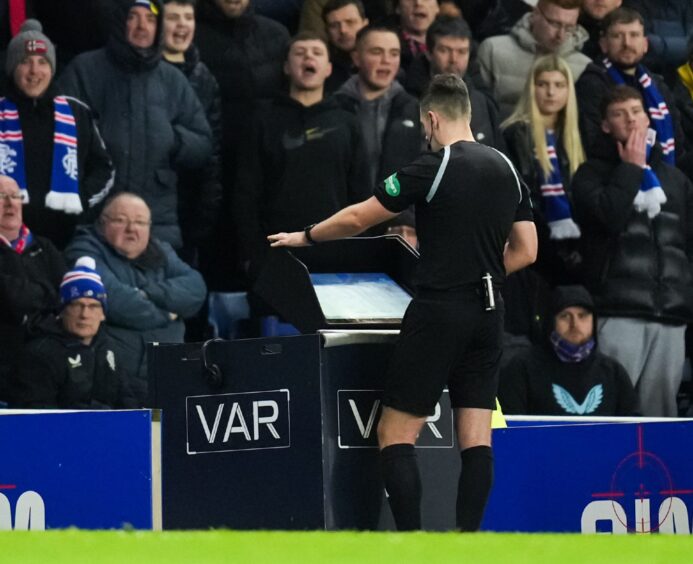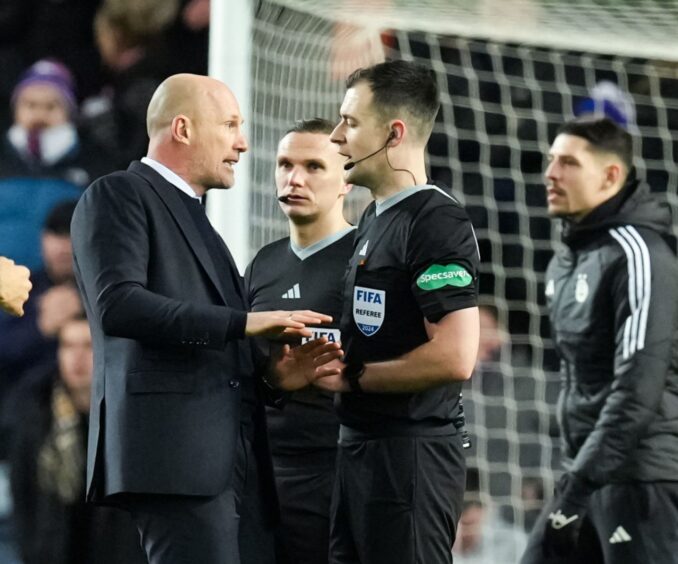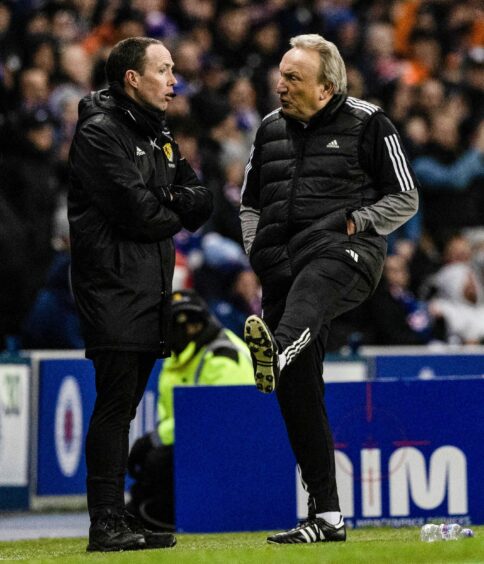The Neil Warnock era at Aberdeen began with a tough away game against Rangers.
Meetings between the two this season have been cagey affairs.
The Dons lost 2-1 in a game that included plenty of refereeing controversy. The man in the middle was Don Robertson, who was supported on VAR by Greg Aitken.
The home team dominated long spells of the game across the 90 minutes.
The first half ended 1-1 and there was nothing too controversial, apart from a few minor refereeing decisions.
Don Robertson was in the way of the ball a couple of times in the first half. Positioning is crucial as a referee, every referee has been caught out and hit by a ball.
There was also an incident when Jamie McGrath went down in the Aberdeen box clutching his head.
Extraordinarily, the referee saw this but allowed play to continue with Aberdeen in possession.
The attacking players, who were unaware of the situation, eventually lost the ball to the home side before the referee eventually decided to stop play.
If there is a head knock you stop the game immediately, you don’t wait and see where the ball is going. The Aberdeen player was clearly in a great deal of discomfort.
Both goals in the first half were fine from a refereeing standpoint.
I initially thought the Aberdeen equaliser would be a closer call but Bojan Miovski timed his run brilliantly.
In the second half, the game exploded into life with plenty of refereeing controversy.
The home team would once again dominate long spells of the game before taking the lead after Kelle Roos parried a save into a dangerous area. He was punished a second time after making a similar mistake for the first goal.
No issues from a refereeing standpoint for the goal.
With just under 10 minutes to go, substitute Luis ‘Duk’ Lopes was involved in a nasty-looking aerial collision with Connor Goldson.
There were big shouts from the home crowd and a strong reaction from the Rangers players. I don’t like when players crowd a referee and try to influence a decision.
Don Robertson opted to show a yellow card to Duk.
My first reaction was that it was two players challenging for an aerial ball, there’s always going to be a chance of dangerous contact.
I think a yellow card was the right decision. It didn’t seem to be a clear, deliberate elbow.
Some home fans were calling for Duk to be sent off later on in the game for a second yellow. He lost the ball and tripped up the opposition player as he fell to the ground.
I felt he could have potentially received a second yellow for this but the referee played advantage and the home team played on.
The foul Duk committed would have stopped a promising attack, if the referee plays advantage, he can’t go back and book Duk.
How do you book someone for stopping a promising attack that he didn’t stop? The answer is you don’t. No red card was the correct call.
Rangers were reduced to 10 men just before the end of 90 minutes. Dujon Sterling received his marching orders for a late tackle on Jack MacKenzie.
Aberdeen were also guilty of surrounding the referee following the incident.
Unfortunately football lacks the on-field respect referees get in the majority of sports.
At first I thought it looked very dangerous as Sterling went flying into the tackle.
The video assistant referee Greg Aitken advised the referee to review the incident.
In what was a shock to everyone in the stadium, the referee stuck with his decision. This has been something I have been screaming for the whole season.
Referees should have the confidence and guts to stick to their original decision.
I personally think the tackle was worthy of a red card. It is one that could have gone either way but I think the speed and how out of control he is means a red was the correct choice.
The referee has to be credited with sticking to his original decision, too often VAR is refereeing games.
Should Aberdeen have been awarded a penalty kick in the dying embers?
This was not the last controversial decision in the game.
With the Dons pushing for a late equaliser, the ball appeared to strike the hand of Connor Goldson. Not just once but twice.
There was no announced VAR check and play resumed.
The incident occurred when the ball was crossed into the box, Dante Polvara knocked the ball down with his shoulder before the ball struck the hand of Goldson.
His hand is not in a natural position, the ball does not travel a great distance but as we have seen this season, that doesn’t mean anything.
I think it is a handball and a penalty should have been awarded.
I was surprised VAR never requested a review, I have seen them given for far less this season.
The second handball shortly after is a bit of a grey area.
The Rangers player stopped the shot on goal with his hand, but he is falling and this arm can be classified as his supporting arm.
I don’t think the second one is a penalty because of this, but the first incident is a penalty.
Throughout the second half the referee was constantly holding his watch in the air and pointing at it so everyone knew he would be adding time on. Aberdeen were wasting time at 1-1 and eight minutes was rightfully added on.
However, when the home team were reduced to ten, there was plenty of time wasting going on. This, however, was not reflected in the minimum of eight minutes added.
Just a small minor detail but something the referee should be consistent with.
Overall, I think the referee and VAR had a poor game but it was refreshing to see a referee not overturn a VAR review.
I was, however, amazed VAR did not request a review on the handball incident towards the end of the game.
Finlay Elder was a registered referee for six years and a category 5 official from 2019, with experience in the Highland League, Juniors and Club Academy.



